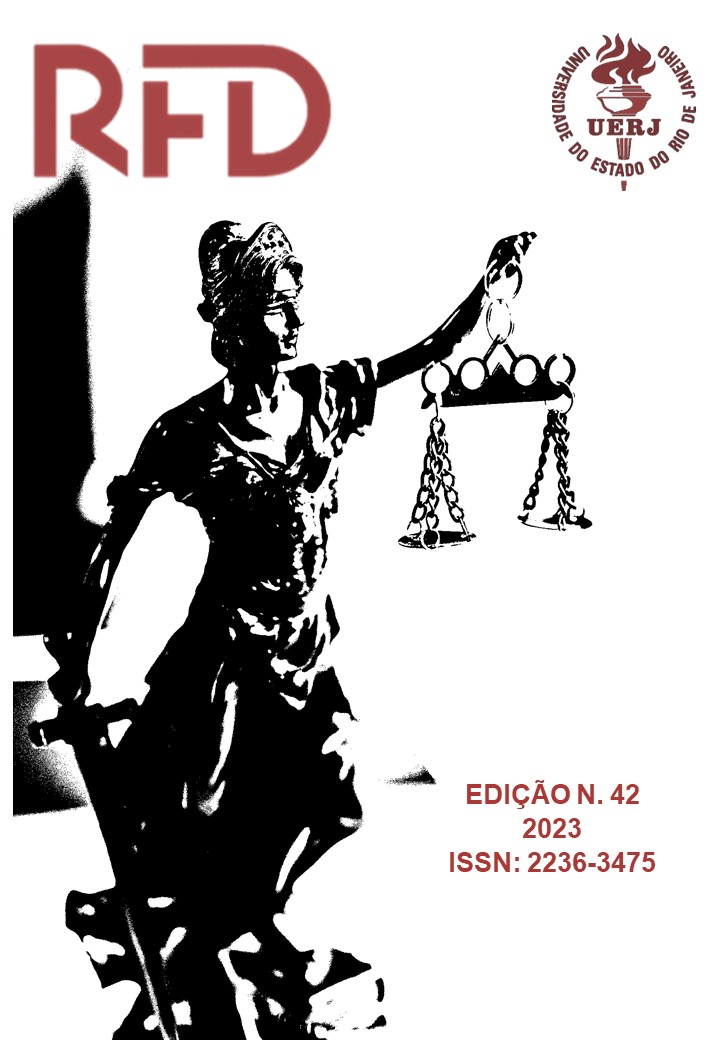A IMPORTÂNCIA DA INTERDISCIPLINARIDADE PARA O SISTEMA JURÍDICO E OS REFLEXOS SOBRE OS DIREITOS DA PERSONALIDADE / THE IMPORTANCE OF INTERDISCIPLINARITY FOR THE LEGAL SYSTEM AND THE REFLECTIONS ON PERSONALITY RIGHTS
DOI:
https://doi.org/10.12957/rfd.2023.61778Palavras-chave:
Interdisciplinaridade. Sistema jurídico. Insuficiência da Lei. Direitos da personalidade. Conselho Nacional de Justiça.Resumo
Resumo: O presente artigo tem por objetivo explorar as acepções das expressões direito e sistema jurídico, bem como a importância da interdisciplinaridade do conhecimento como mecanismo de aprimoramento da interpretação e aplicação do direito (direito-norma). Como problema de pesquisa, pretende-se discutir se o direito deve se abrir para outras áreas do conhecimento e quais as consequências da opção de seu fechamento e/ou abertura. Muitas questões levadas ao Poder Judiciário, seja no campo dos direitos fundamentais, seja no campo dos direitos da personalidade, são solucionadas pelo prisma da autossuficiência do direito. Significativa parte da produção teórica em matéria de direito, todavia, é vazia de conteúdo e incapaz de solver problemas de cunho metajurídico. A pertinência da pesquisa reside no fato de o Conselho Nacional de Justiça ter dado indicativos, por meio de resolução regulatória de concurso de ingresso na magistratura (Resolução 75), de que apenas a interdisciplinaridade é capaz de abrir o direito para outras áreas do conhecimento e, com isso, municiar o intérprete de um plexo de instrumentos adequados para o solucionamento de questões jurídicas especialmente complexas. Como percurso metodológico para o desenvolvimento do trabalho, utilizar-se-á do método hipotético-dedutivo. Aventa-se, como hipótese, a ser corroborada ou refutada ao longo da pesquisa, que o Poder Judiciário, enquanto instrumento de tutela de direitos fundamentais e da personalidade, ao exercitar a tomada de decisão a partir da valorização da interdisciplinaridade, realiza a justiça mais adequada ao caso concreto em decorrência da denominada complementaridade do conhecimento. Como procedimento, objetiva-se o aprofundamento teórico por meio de pesquisa bibliográfica nas bases de dados da Scopus, EBSco e Google Acadêmico.
Palavras-chave: Interdisciplinaridade. Sistema jurídico. Insuficiência da Lei. Direitos da personalidade. Conselho Nacional de Justiça.
Abstract: This article aims to explore the meanings of the expressions law and legal system, as well as the importance of the interdisciplinary knowledge of the mechanism for improving the interpretation and application of law (law-norm). As the research problem, it is intended to discuss whether the law should open up to other areas of knowledge and what are the consequences of the option of closing it and/or opening it. Many issues taken to the Judiciary, whether in the field of fundamental rights or in the field of personality rights, are resolved through the prism of the self-sufficiency of law. A significant part of the theoretical production in matters of law, however, is empty of content and incapable of solving meta-legal problems. The relevance of the research lies in the fact that the National Council of Justice has given indications, through a regulatory resolution for admission to the judiciary (Resolution 75), that only interdisciplinarity is able to open the law to other areas of knowledge and, thus, providing the interpreter with a set of instruments suitable for solving particularly complex legal issues. How to go through the methodology for the development of the work, using the hypothetical-deductive method. It is suggested, as a hypothesis, to be corroborated or refuted throughout the research, that the Judiciary, as an instrument of protection of fundamental rights and personality, when exercising decision-making based on the appreciation of interdisciplinarity, performs justice more to the concrete case as a result of the so-called complementarity of knowledge. As a procedure, the objective is the theoretical deepening through bibliographical research in the databases of Scopus, EBSc and Google Scholar.
Keywords: Judicialization of health. Consequentialism. Personality rights. Law of Introduction to the Rules of Brazilian Law.
Downloads
Publicado
Como Citar
Edição
Seção
Licença
Direitos Autorais
oArtigos publicados na Revista da Faculdade de Direito da UERJ (RFD/UERJ)
Os Direitos autorais dos artigos publicados pertencem à Revista da Faculdade de Direito da UERJ (RFD/UERJ). É permitida a reprodução total ou parcial dos artigos desde que citada a fonte.
oReprodução parcial de outras publicações
Artigos submetidos que contiverem partes de texto extraídas de outras publicações deverão obedecer aos limites especificados para garantir originalidade do trabalho submetido. Plágio em todas as suas formas constitui comportamento antiético e é inaceitável.
Recomenda-se evitar a reprodução de tabelas e ilustrações, extraídas de outras publicações. O artigo que contiver reprodução de uma ou mais tabelas e/ou ilustrações de outras publicações só será encaminhado para análise se vier acompanhado de permissão escrita do detentor do direito autoral do trabalho original para a reprodução especificada na Revista da Faculdade de Direito da UERJ (RFD/UERJ). A permissão deve ser endereçada ao autor do trabalho submetido. Em nenhuma circunstância a Revista da Faculdade de Direito da UERJ (RFD/UERJ) e os autores dos trabalhos publicados nesta revista repassarão direitos assim obtidos.
·Os trabalhos não aceitos para a publicação serão devolvidos aos autores, se solicitado.
A Revista da Faculdade de Direito está licenciada com uma Licença Creative Commons Atribuição 4.0 Internacional.
Este trabalho está licenciado sob uma Licença Creative Commons 4.0, Atribuição-Sem Derivações.
Esta licença permite copiar e redistribuir o material em qualquer suporte ou format para qualquer fim, mesmo que comercial, desde de que citada a autoria original.











